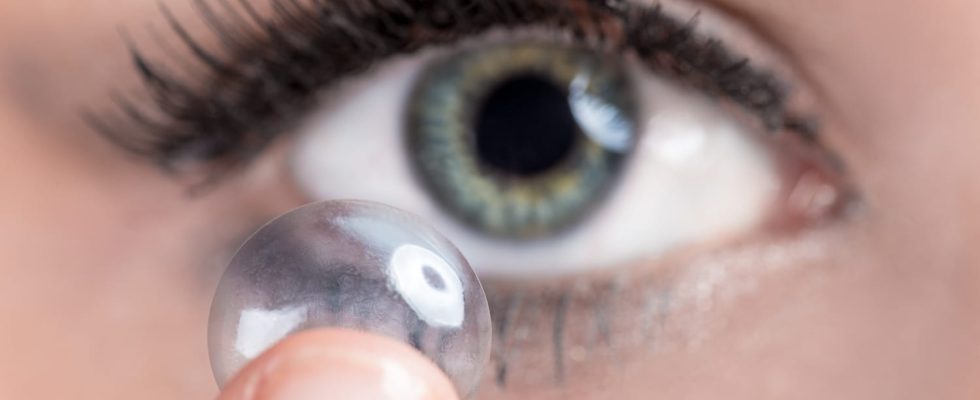Science continues to advance to treat vision loss. Among the new treatments, orthokeratology. A technique based on wearing special lenses that are only worn at night and would be able to correct myopia or hyperopia.
What if to cure your myopia, all you had to do was wear lenses at night ? It is the principle of orthokeratologya technical who keeps doing new followers. “Orthokeratology has democratized in 2005 when it was discovered that it allowed reduce evolution myopia” informs us Dr Dr Sirine Hammoud, ophthalmologist. What is orthokeratology? What are the effects on myopia and presbyopia? Are there any side effects and contraindications? What are the prices ? Discovery.
Definition: what is orthokeratology?
Orthokeratology is a temporary vision reduction technique such as myopia or astigmastia by wearing rigid lenses at night. “We prescribe rigid lenses of particular curvature and tailor-made to put on at night. Wearing this device overnight for at least 6 to 8 hours modifies the shape of the eye which regains correct sight during the day. Lenses correct vision by flattening or bulging the cornea. The device is effective after a few nights“says Dr. Sirine Hammoud, ophthalmologist. “Moreover, it is a reversible system“ recalls our interlocutor.
For who ?
Progressive or stabilized myopia, astigmatism and hypermetropia are the main indications for orthokeratology. It is prescribed as a second intention in presbyopia. “They allow correct myopia up to 7 diopters, hyperopia up to 4 diopters and astigmatism up to 4 diopters“says Dr. Hammoud. Beyond that, the lenses do not work sufficiently. “This technique is interesting for children who do not wish to wear glasses, for example. For adults, orthokeratology frees up daytime correction” emphasizes the ophthalmologist.
Lenses that do not dry out the eye.
Orthokeratology is particularly indicated in transient device in case of progressive myopia who must wait to be stabilized to perform surgery. “Finally, some people do not support soft lenses because they can dry out the eye, while rigid lenses do not cause this effect.” adds our expert. They are therefore well suited for people with sensitive eyes.
What effects on myopia?
“Orthokeratology lenses correct myopia by slightly flattening its cornea during nighttime wear“says Dr. Hammoud. This technology allows in particular to slow down the progression of myopia.
What effects on presbyopia?
Orthokeratology can correct presbyopia by wearing it at night but it is generally indicated as a second intention for this visual disturbance. “Generally, soft progressive lenses are first recommended as first intention“remarks the ophthalmologist.
Who practices orthokeratology?
In France, these are the ophthalmologists only who can prescribe orthokeratology lenses.
What are the side effects of orthokeratology?
“If the lenses don’t fit, they sit in the wrong place, they can cause an area of friction with a risk of scarring” recalls our interlocutor. Like any foreign body, there is a possible risk of infection, which is nevertheless less than with soft lenses. “It is imperative to plan 3 to 4 check-up appointments with your ophthalmologist to check that the lens fits well and that the fitting process is secure” insists Dr. Hammoud. We also observe certain nocturnal constraints. “Orthokeratology slightly reduces night vision. She provokes a smudge effect on the lights at night which implies a contraindication in people who drive at night” supports our expert. The ophthalmologist recommends always starting to test the wearing of “classic” soft lenses during the day. If they are well tolerated, rigid orthokeratology lenses are prescribed.
Between 350 and 450 euros.
What are the contraindications for orthokeratology?
People with Corneal surface pathology or irregularity of the latter present a contraindication to orthokeratology. Furthermore, thePatients who have already had corneal surgery are not eligible to wear night lenses.
What are the orthokeratology prices?
“In France and according to age, the pair of lenses in orthokeratology costs between 350 and 450 euros for annual renewal. The so-called adaptation cost including safety consultations is between 200 and 400 euros depending on the rates charged“says our expert.
Is orthokeratology reimbursed?
Orthokeratology is not reimbursed by Social Security. Only the lenses are partially covered by certain mutuals.
Thanks to Dr Sirine Hammoud, ophthalmologist.
